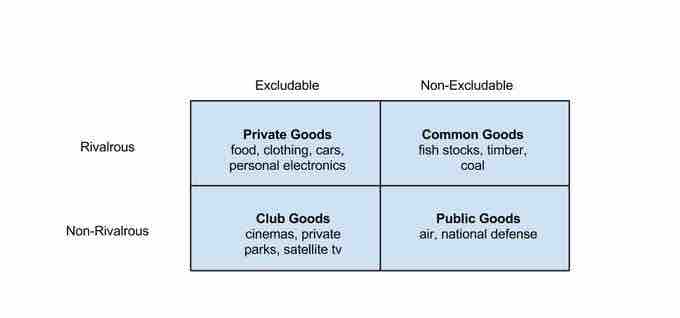There are four categories of goods in economics, which are defined based on two attributes. The first attribute is excludability, or whether people can be prevented from using the good. The second is whether a good is rival in consumption: whether one person's use of the good reduces another person's ability to use it.
National defense provides an example of a good that is non-excludable. America's national defense establishment offers protection to everyone in the country. Items on sale in a store, on the other hand, are excludable. The store owner can prevent a customer from obtaining a good unless the customer pays for it. National defense also provides an example of a good that is non-rivalrous. One person's protection does not prevent another person from receiving protection. In contrast, shoes are rivalrous. Only one person can wear a pair of shoes at a time.
Combinations of these two attributes create four categories of goods :

Four Types of Goods
There are four categories of goods in economics, based on whether the goods are excludable and/or rivalrous in consumption.
- Private goods: Private goods are excludable and rival. Examples of private goods include food, clothes, and flowers. There are usually limited quantities of these goods, and owners or sellers can prevent other individuals from enjoying their benefits. Because of their relative scarcity, many private goods are exchanged for payment.
- Common goods: Common goods are non-excludable and rival. Because of these traits, common goods are easily over-consumed, leading to a phenomenon called "tragedy of the commons. " In this situation, people withdraw resources to secure short-term gains without regard for the long-term consequences. A classic example of a common good are fish stocks in international waters. No one is excluded from fishing, but as people withdraw fish without limits being imposed, the stocks for later fishermen are depleted.
- Club goods: Club goods are excludable but non-rival. This type of good often requires a "membership" payment in order to enjoy the benefits of the goods. Non-payers can be prevented from access to the goods. Cable television is a classic example. It requires a monthly fee, but is non-rival after the payment.
- Public goods: Public goods are non-excludable and non-rival. Individuals cannot be effectively excluded from using them, and use by one individual does not reduce the good's availability to others. Examples of public goods include the air we breathe, public parks, and street lights. Public goods may give rise to the "free rider problem. " A free-rider is a person who receives the benefit of a good without paying for it. This may lead to the under-provision of certain goods or services.